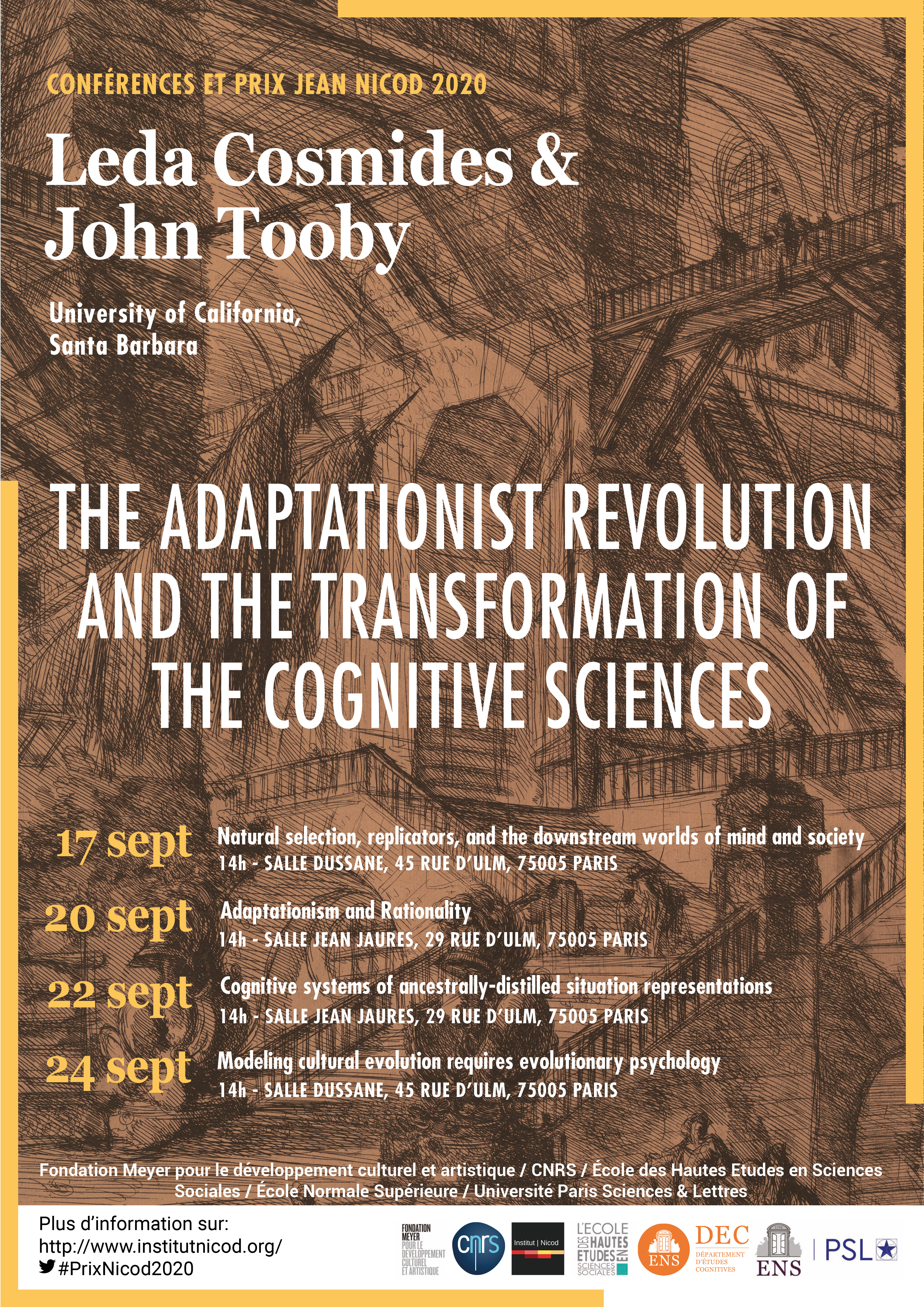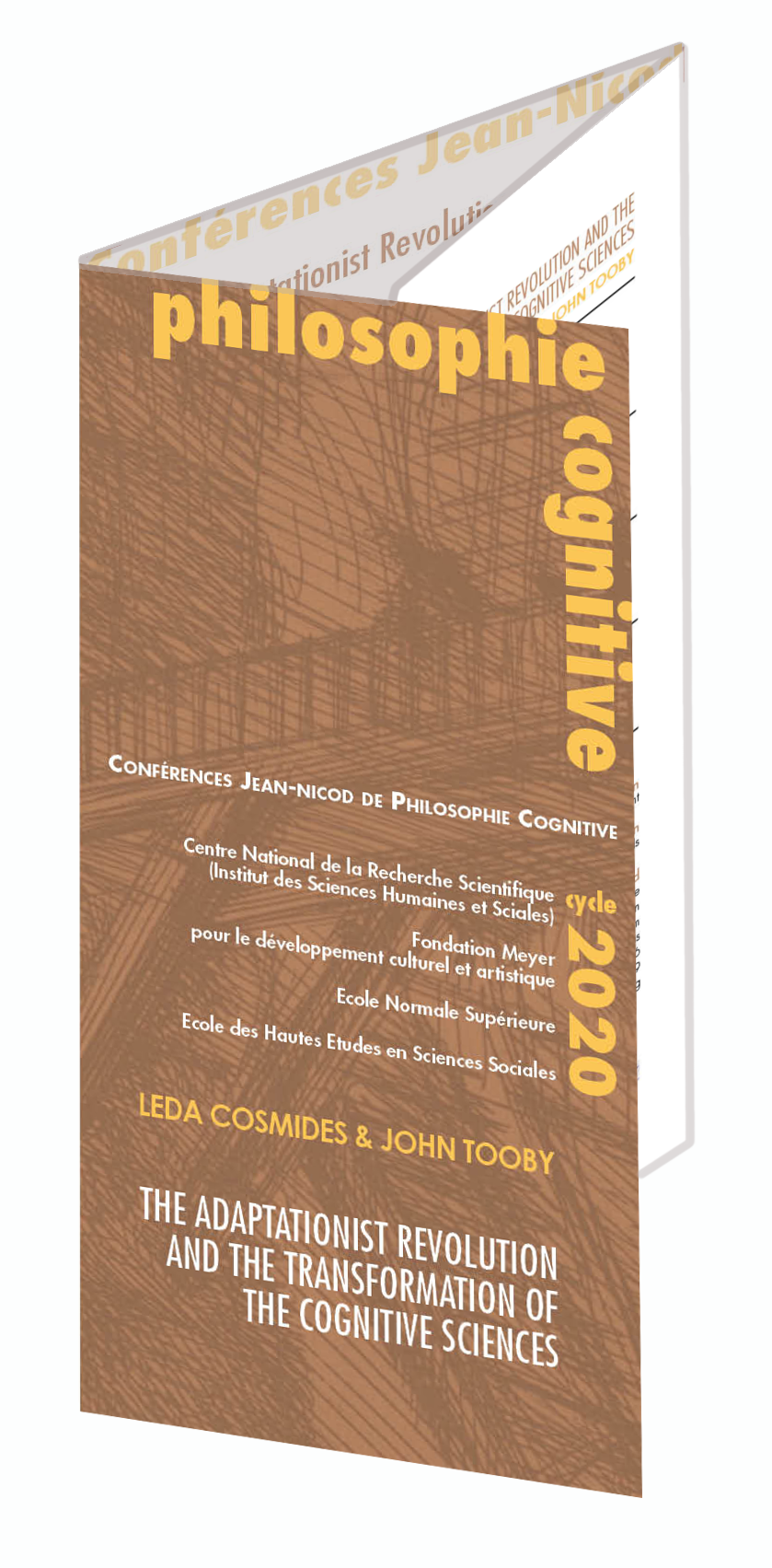
Natural selection, replicators, and the downstream worlds of mind and society
ENS, salle Dussane, 45 rue d'Ulm, 75005 Paris
Jean-Nicod Lectures and Prize 2020

Leda Cosmides et John Tooby are known for their pioneering work in the field of evolutionary psychology and cognitive science. After studying at Harvard and Stanford, they were appointed professors at the University of California at Santa Barbara where they direct the Center for Evolutionary Psychology. Their work on the adaptive nature of social emotions, kinship, cooperation and reasoning biases has had a considerable impact on psychology and behavioural science. They are also known for their contribution to the conceptual foundations of evolutionary approaches in the humanities through the publication of the seminal book of evolutionary psychology, The Adapted Mind : Evolutionary psychology and the generation of culture, which is now one of the most cited books in psychology. In 2013, they received the Human Behavior and Evolution Society’s Lifetime Achievement Award.
A first award ceremony happened virtually on December 15th 2020. Due to the the disrupted year, the series of four lectures that normally immediately follows the award ceremony will take place in Paris at the Ecole normale supérieure in september 2021.

The conferences will be broadcasted live on the DEC youtube channel.
Natural selection, replicators, and the downstream worlds of mind and society - John Tooby
Presentation of the Jean-Nicod Prize and cocktail after the conference
Friday 17 September - 2pm
Ecole normale supérieure, Salle Dussane
45 rue d’Ulm, 75005 Paris
Over recent decades, many researchers have realized that integrating the evolutionary sciences and information theory with the human sciences can offer a secure foundation out of which to crystalize a more unified and mutually illuminating network of interlocking disciplines. This encompassing framework also offers new directions and some surprising resolutions of long-standing problems in cognitive science and philosophy. The key to this framework lies in the recognition that replication is a physical process that imposes its own proprietary, alternative objective kind of physical order—replicative rather than thermodynamic order. Thus it provides objective frames of reference not susceptible to substantial relativist critiques. Natural selection is the only natural process capable of pushing living organization uphill against entropy, and the only source of this functional order. Hence, replicative order provides the only definition of order appropriate to predicting, explaining, and understanding the functional designs of organisms, including those of their cognitive systems. With a series of examples, we will explore the potential for replicative order to illuminate mind, behavior, and culture.
Adaptationism and Rationality - Leda Cosmides
Monday 20 September - 2pm
Ecole normale supérieure, Salle Jean-Jaurès
29 rue d’Ulm, 75005 Paris
How the mind works can be illuminated by comparing human cognition to standards of good design specified by a normative theory. But which standards are appropriate for an evolved organism ? What counts as a rational inference or choice for animals like us, whose minds were designed by natural selection ?
Research using normative theories from mathematics and logic painted human cognition as irrational, riddled with errors, biases, and flawed heuristics. Yet natural reasoning systems negotiate the complex natural tasks of their world with a level of operational success far surpassing that of the most sophisticated existing artificial intelligence systems. What is the resolution to this paradox ? From the perspective of evolutionary biology, the problem is not that our thinking is irrational ; it is how psychology has been defining and testing for rationality. With six case studies, we show how this approach can uncover sophisticated cognitive mechanisms, and illustrate the pitfalls of studying the computational systems that produce reasoning without reference to the ancestral problems and environments that selected for their design.
Cognitive systems of ancestrally-distilled situation representations - John Tooby
Wednseday 22 September - 2pm
Ecole normale supérieure, Salle Jean-Jaurès
29 rue d’Ulm, 75005 Paris
For 4 billion years, not a single one of our direct ancestors has ever failed to reproduce. In a world of randomness and entropy, how is this remotely possible ? Moreover, each developing human mind constructs content that is remarkably rich, unique to that individual, and immensely contingent. How can this be reconciled with the claim that the mind runs according to an evolutionary functional logic, and does not start out as a blank slate ?
Natural selection filters for those propagative designs that reliably develop adaptations—including mental programs—that are prepared to meet ancestrally recurrent aspects of the world that were associated with their respective missions (functions). Our evolved architecture is designed to clothe the individual’s contingent world of tokens (e.g, this person, that reptile) in species-universal garments of evolved meaning (e.g., mother, snake) with the help of situation representations. Situation representations provide the shared “code” between the world (as sender) and the organism (as receiver) necessary for learning to proceed. Human mental content is not fully culturally arbitrary ; our rich heritage of species-typical cognitive adaptations endows humans everywhere with a common suite of interpretive and motivational frames that connect us all.
Modeling cultural evolution requires evolutionary psychology - Leda Cosmides
Friday 24 September - 2pm
Ecole normale supérieure, Salle Dussane
45 rue d’Ulm, 75005 Paris
Cultural differences can arise in surprising ways. All depend on details of our evolved psychology.
Inference, learning, and motivation are regulated by a variety of evolved computational systems, each specialized for a specific domain. Each interprets experience using its own native concepts, generates knowledge that goes beyond the information given, and activates domain-appropriate goals. They influence cultural transmission by making some ideas, feelings, and reactions seem more reasonable, interesting, or memorable than others.
But cultural transmission is not the only route by which cultural differences can arise. Cultural patterns can be evoked, rather than transmitted, when (1) specialized mechanisms are exposed to different environments ; (2) several alternative, cue-activated evolved systems give rise to divergent moral intuitions and motivations ; or (3) a single system is designed to respond nimbly to key cues, shifting behavior immediately ; these shifts can be misattributed to cultural selection of institutions. More powerful and predictive models of cultural evolution will require evolutionary psychology.
HEALTH MEASURES : Conferences will be subject to the following health measures in force :
- Mandatory up-to-date Health Pass (for more information, see the government website)
- Compulsoty wearing of a mask

Bibliographic selection
- 2018 Sznycer, D., Xygalatas, D., Agey, E., Alami, S., An, X. F., Ananyeva, K. I., ... & Tooby, J. Cross-cultural invariances in the architecture of shame. Proceedings of the National Academy of Sciences, 115(39), 9702-9707.
- 2013 Cosmides, L., & Tooby, J. Evolutionary psychology : New perspectives on cognition and motivation. Annual review of psychology, 64, 201-229.
- 2010 Tooby, J., & Cosmides, L. Groups in mind : The coalitional roots of war and morality. Human morality and sociality : Evolutionary and comparative perspectives, 91-234.
- 2004 Cosmides, Leda and John Tooby. “Evolutionary Psychology and the Emotions,” in Handbook of Emotions. Michael Lewis and Jeannette M. Haviland-Jones, eds. New York : Guilford.
- 2002 Klein, S. B., Cosmides, L., Tooby, J., & Chance, S. Decisions and the evolution of memory : multiple systems, multiple functions. Psychological review, 109(2), 306.
- 2001 Kurzban, R., Tooby, J., & Cosmides, L. Can race be erased ? Coalitional computation and social categorization. Proceedings of the National Academy of Sciences, 98(26), 15387-15392.
- 1994 Cosmides, L., & Tooby, J. Beyond intuition and instinct blindness : Toward an evolutionarily rigorous cognitive science. Cognition, 50(1-3), 41-77.
- 1992 Tooby, J., & Cosmides, L. The psychological foundations of culture. In J. H. Barkow, L. Cosmides, & J. Tooby (Eds.), The Adapted mind : Evolutionary psychology and the generation of culture (p. 19).
- 1989 Cosmides, L. The logic of social exchange : Has natural selection shaped how humans reason ? Studies with the Wason selection task. Cognition, 31(3), 187-276.
- 1987 Tooby, J. & DeVore, I. The reconstruction of hominid behavioural evolution through strategic modelling. In : The evolution of human behaviour, ed. W. Kinzey. State University of New York Press.
For any question, please contact : prixjeannicod@gmail.com
> Frédérique de Vignemont - Secretary of the Jean-Nicod Prize
> Marie Lods - Communication assistant of the Institut Jean-Nicod.


